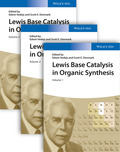Lewis Base Catalysis in Organic Synthesis

1. Auflage September 2016
1488 Seiten, Hardcover
Handbuch/Nachschlagewerk
Kurzbeschreibung
Edited by the leading scientists in the field, this three-volume handbook is the first to cover all the important aspects of Lewis-base catalysis and is thus the ultimate one-stop reference on this hot topic.
This three-volume set represents the first comprehensive coverage of the rapidly expanding field of Lewis base catalysis that has attracted enormous attention in recent years. Lewis base catalysis is a conceptually novel paradigm that encompasses an extremely wide variety of preparatively useful transformations and is particularly effective for enantioselectively constructing new stereogenic centers. As electron-pair donors, Lewis bases can influence the rate and stereochemical course of myriad synthetic organic reactions. The book presents the conceptual/mechanistic principles that underlie Lewis base catalysis, and then builds upon that foundation with a thorough presentation of many different reaction types. And last but not least, the editors, Prof. Edwin Vedejs and Prof. Scott E. Denmark, are without doubt the leaders in this emerging field and have compiled high quality contributions from an impressive collection of international experts.
PRINCIPLES
Definitions, terminology, and orbital treatment
Thermodynamic treatments of Lewis basicity
Kinetic treatments of Lewis basicity and nucleophilicity
MECHANISM AND LEWIS BASE CATALYSIS: NUCLEOPHILICITY IS ONLY PART OF THE STORY
Anhydride activation by 4-dialkylaminopyridines and analogs (n->pi*)
LB catalysis vs. general base catalysis in enantioselective reactions
LB catalyzed-protic acid mediated reactions (n->pi*)
Mechanistic options for the Morita-Baylis-Hillman reaction (n->pi*)
Mechanism of C-Si cleavage using anionic Lewis base (n->sigma*)
LB catalyzed - Lewis Acid mediated reactions (n->sigma*)
Bifunctional LB catalysis with dual activation of R-M and C=O (n->sigma*)
Bifunctional LB catalysis with dual activation of C=O and B H or B C (n->sigma*)
APPLICATIONS: LEWIS BASE CATALYSIS INVOLVING AN n->pi* ACTIVATION STEP
Acyl transfer catalyzed by Lewis bases
Morita-Baylis-Hilman reaction and vinylogous MBH
Beyond MBH
Iminium Catalysis
Enamine Catalysis
APPLICATIONS: ENHANCED NUCLEOPHILICITY BY LEWIS BASE ACTIVATION (n->pi*; n->sigma*)
Si C-X and Si C-EWG as carbanion equivalents under LB catalysis.
LB-Enhanced nucleophilicity for M-M' = Si-Si, Si-B, Sn-Sn, B-B
APPLICATIONS: ENHANCED ELECTROPHILICITY AND DUAL ACTIVATION BY LEWIS BASE (n->sigma*)
LB catalyzed reactions of SiX3-based reagents with C=O, C=N
Aldolization
Reductions using HSiX3-based reagents
Reactions of epoxides
LEWIS BASE CATALYZED GENERATION OF ELECTROPHILIC INTERMEDIATES
Y-X + LB ->¿electrophilic reagents for enantioselective addition to alkenes (n->sigma*)
BIFUNCTIONAL (AND MULTIFUNCTIONAL) CATALYSIS
Bifunctional activation in reactions involving Lewis acid catalysis and Lewis base assisted bond polarization (n->sigma*)
Bifunctional catalysis with Lewis base containing X-H sites that facilitate proton transfer or hydrogen bonding
CARBENES:LEWIS BASE CATALYSIS TRIGGERS MULTIPLE ACTIVATION PATHWAYS
Catalysis with Stable Carbenes
Summation
Scott E. Denmark was born in New York on 17 June 1953. He obtained an S. B. degree from M.I.T. in 1975 and a D. Sc. Tech degree in 1980 from the ETH-Zürich under the direction of Professor Albert Eschenmoser. That same year he began his career as assistant professor at the University of Illinois. He was promoted to associate professor in 1986, full professor in 1987 and then in 1991 named the Reynold C. Fuson Professor of Chemistry. Professor Denmark?s research interests focus on the invention of new synthetic reactions and elucidating the origins of stereocontrol in novel, asymmetric transformations. He has pioneered the concept of chiral Lewis base activation of Lewis acids for catalysis in main group chemistry. His group has also developed palladium-catalyzed cross-couplings with organofunctional silicon compounds. In addition he is well-known for the development and application of tandem cycloadditions of nitroalkenes for the synthesis of complex natural and unnatural nitrogen containing compounds. In recent years, his group has investigated the use of chemoinformatics to identify and optimize catalysts for a variety of organic and organometallic reactions. Professor Denmark has won a number of honors for both research and teaching including: an NSF Presidential Young Investigator Award, A. C. Cope Scholar Award (ACS), Alexander von Humboldt Senior Scientist Award, Pedler Lecture and Medal (RSC), the ACS Award for Creative Work in Synthetic Organic Chemistry, the Yamada-Koga Prize, the Prelog Medal (ETH-Zürich), the H. C. Brown Award for Creative Research in Synthetic Methods (ACS), Robert Robinson Lecture and Medal (RSC), the ISHC Senior Award in Heterocyclic Chemistry, Paul Karrer Lectureship (Uni Zürich), the Frederic Stanley Kipping Award for Research in Silicon Chemistry (ACS), and the Harry and Carol Mosher Award (Santa Clara Section, ACS). He is a Fellow of the Royal Society of Chemistry and the American Chemical Society. He edited Volume 85 of Organic Syntheses, was Editor of Volumes 22-25 of Topics in Stereochemistry and was a founding Associate Editor of Organic Letters (1999-2004). After serving on the editorial board from 1994-2003, he became Editor in Chief and President of Organic Reactions, Inc. in 2008.


